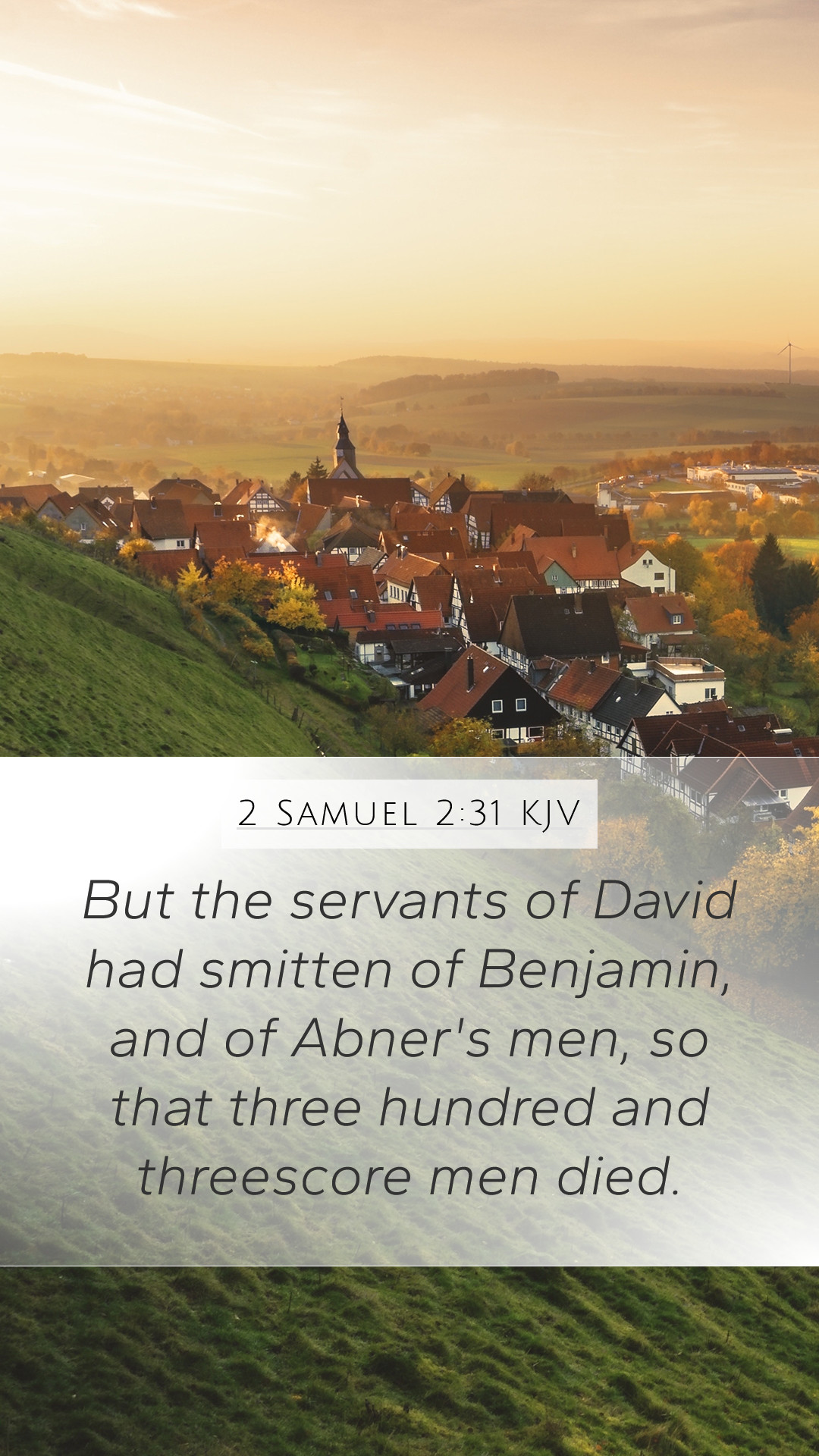Understanding 2 Samuel 2:31
Bible Verse: 2 Samuel 2:31 (KJV) - "But the sons of Rimmon the Beerothite, Rechab and Baanah, escaped and went and told David."
Introduction to the Verse and Context
In 2 Samuel 2, the narrative details the transition of power following Saul's death, reflecting on the ongoing conflict between David and the house of Saul. This particular verse highlights a significant moment in this power struggle, showcasing the decisions and actions of various leaders in the aftermath of Saul's demise.
Verse Explanation
The verse recounts how two individuals, Rechab and Baanah, who were the sons of Rimmon, survived the conflict and chose to inform David about their actions, signifying their allegiance and intentions.
Insights from Public Domain Commentaries
- Matthew Henry: Henry emphasizes the boldness of Rechab and Baanah, noting how their decision to escape and align themselves with David could potentially influence the future dynamics of leadership in Israel. He reflects on their motivations and the role of divine providence in the unfoldment of events.
- Albert Barnes: Barnes provides additional historical context by explaining the significance of Beeroth and its inhabitants. He elaborates on how the actions of these individuals contributed to the broader narrative of David's rise to kingship and the eventual division of Israel.
- Adam Clarke: Clarke discusses the motif of survival in a tumultuous period and suggests that Rechab and Baanah’s allegiance is a poignant commentary on loyalty amidst shifting political tides. He highlights their desire for favor with David, capturing the essence of the struggle for power during this time.
Key Themes and Symbolism
This verse embodies several key themes important for understanding Scripture:
- Allegiance and Loyalty: The actions of Rechab and Baanah reflect themes of loyalty and betrayal, essential in the narrative surrounding David's kingship.
- Survival in Adversity: The escape of these individuals serves as a symbol of hope and the possibility of shifting fortunes in times of political instability.
- Divine Providence: The unfolding of events signifies the hand of God in establishing David as king while highlighting the importance of human decisions in the process.
Relation to Other Scriptural Passages
Understanding this verse is enriched by its connections to other biblical texts. Here are some cross-references:
- 1 Samuel 16:13: The anointing of David as king.
- 2 Samuel 1:14-16: David’s response to the death of Saul.
- 2 Samuel 4:5-12: The fate of Rechab and Baanah for their actions against Ishbosheth.
Practical Application
When analyzing this verse, believers can draw important lessons:
- Assessing Allegiance: Reflect on the importance of loyalty in personal life and faith; whose side are we truly on in times of conflict?
- Understanding Leadership: Examine the qualities of leadership and how personal character and decisions shape the legacy of leaders.
- Seeking Divine Guidance: Acknowledge the role of God in our lives amidst uncertainty, trusting in His providential care.
Conclusion
2 Samuel 2:31 serves as a critical junction in the narrative of David's ascent to power and the dynamics of relationships in a fractured kingdom. It invites deeper reflection on themes of loyalty, divine intervention, and the human experience of navigating complex socio-political landscapes.
Further Study Recommendations
For those wishing to deepen their understanding of this verse and its implications, consider engaging with the following:
- Bible study groups focused on the life of David.
- Online Bible study resources that explore the context of the Old Testament.
- Bible study guides that focus on themes of leadership and loyalty throughout Scripture.


